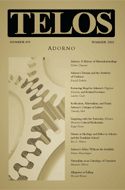Maurizio Meloni’s “Naturalism as an Ontology of Ourselves” appears in Telos 155 (Summer 2011). Read the full version online at the Telos Online website, or purchase a print copy of the issue in our store.
 Scientific naturalism, according to Jürgen Habermas, represents one of the “two countervailing trends that mark the intellectual tenor of our age,” the other being religious worldviews. Using Foucault’s distinction between philosophy as an “analytic of truth” and philosophy as an “ontology of the present” and “ontology of ourselves,” this essay addresses naturalism less as an epistemological issue than as a global way of rethinking humanness, that is as the theoretical “correlative” of certain local practices, which, under the influence of leading sciences such as neuroscience and molecular biology, contribute today to the naturalization of the human. In the second part of the essay, I will discuss three hermeneutic models through which leading Continental thinkers have reacted to this intertwinement of naturalism and the human condition in modernity: naturalism as a break, as a danger, and as a loss. From their reactions, the antinaturalistic legacy of much of Continental philosophy emerges clearly, and invites us to think of the present naturalistic epoch in a more radical way.
Scientific naturalism, according to Jürgen Habermas, represents one of the “two countervailing trends that mark the intellectual tenor of our age,” the other being religious worldviews. Using Foucault’s distinction between philosophy as an “analytic of truth” and philosophy as an “ontology of the present” and “ontology of ourselves,” this essay addresses naturalism less as an epistemological issue than as a global way of rethinking humanness, that is as the theoretical “correlative” of certain local practices, which, under the influence of leading sciences such as neuroscience and molecular biology, contribute today to the naturalization of the human. In the second part of the essay, I will discuss three hermeneutic models through which leading Continental thinkers have reacted to this intertwinement of naturalism and the human condition in modernity: naturalism as a break, as a danger, and as a loss. From their reactions, the antinaturalistic legacy of much of Continental philosophy emerges clearly, and invites us to think of the present naturalistic epoch in a more radical way.



